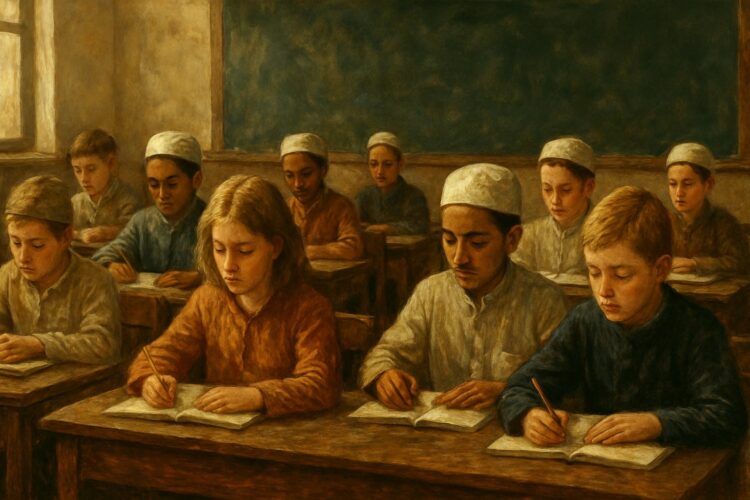Vienna, often celebrated as the cultural heart of Europe, is undergoing a significant demographic shift in its school population. According to official data from Vienna’s School Council, Muslim students now make up 41.2% of the enrollment in government-run elementary schools, while students from all Christian denominations collectively account for 34.5%. Experts view this as a notable demographic shift, reflecting broader changes in migration patterns and cultural diversity within the Austrian capital.
This revelation has triggered an intense political debate in Austria and should raise alarms in India as well, where similar patterns are emerging with severe long-term consequences.
The data, compiled by the office of Vienna’s City Councillor for Education, Bettina Emmerling (Neos), covers around 112,600 students across all types of schools. Reports highlight how German is increasingly becoming a second language, which is severely impacting the quality of education. Evelyn Kometter of the Austrian Parents’ Association confirmed the gravity of the crisis: teachers now need to repeat instructions 10–12 times for children to comprehend, severely hampering classroom efficiency and learning.
Ethnic Austrian families, feeling alienated and unsafe, are reportedly withdrawing their children from urban schools, further accelerating the demographic drift.
The right-wing Freedom Party of Austria has called this change what it plainly is—“displacement, not immigration.” Party member Hannes Amesbauer starkly warned, “Austrians will soon be strangers in their own country.” The government’s response—a new subject titled “Living in a Democracy” aimed at teaching tolerance and social harmony—has done little to ease growing fears, as critics argue the problem runs far deeper than classroom lessons can solve.
Europe’s Crisis: A Self-Inflicted Cultural Decline
This shift in Vienna is not a sudden accident but the inevitable result of years of reckless immigration policies. Countries like Germany, Sweden, and Austria—under the guise of multiculturalism and compassion—opened their doors to millions from Islamic nations such as Syria, Iraq, Afghanistan, and Somalia, often without a long-term integration strategy.
Instead of assimilation, this has led to the formation of segregated ghettos, a language crisis in classrooms, a surge in crime, and even “no-go zones”—areas where local police warn Jews and homosexuals not to enter, due to the growing dominance of hardline Islamic enclaves.
Concerns over such demographic changes were long flagged by so-called “far-right” groups but were conveniently dismissed by the liberal elite as xenophobic fearmongering. Today, however, the evidence is undeniable: classroom statistics, crime data, social unrest, and rising ethnic tensions are telling a story of deep-rooted societal change—one that Europe may no longer be able to reverse.
Even traditionally centrist parties are waking up. Germany’s Social Democratic Party has come under pressure to tighten borders. In Denmark, the ruling Social Democrats—once champions of liberal immigration—have adopted tough anti-immigrant policies under PM Mette Frederiksen.
In September 2024, The Guardian reported that Sweden, France, Germany, the Netherlands, and Finland all vowed to impose stricter immigration rules, largely under pressure from the rising right.
This policy shift seems to be working: irregular border crossings into the EU dropped by 31% in the first quarter of 2025. But the urgency of action is underscored by the fact that in 2023, illegal border crossings had risen by 17%—the highest since 2016—reaching a shocking 380,000 entries.
India Cannot Afford to Ignore the Writing on the Wall
While Europe is only now beginning to grapple with this civilizational crisis, India has already paid dearly for ignoring similar trends.
The Kashmir exodus remains the most brutal example—where lakhs of Kashmiri Pandits were driven out in the 1990s by Islamist radicals in a well-orchestrated ethnic cleansing operation. They remain refugees in their own homeland, even today.
Recent demographic data paints a disturbing picture elsewhere too. As per reports, certain districts along the Indo-Nepal border have seen the Muslim population rise by over 32% since 2011, while the national growth average for all communities is just 14%. Entire villages have undergone a demographic turnover, raising serious concerns over illegal infiltration and cross-border radicalisation. The need to expand BSF jurisdiction in these regions has become more urgent than ever.
Urban areas have not been spared either. In several Indian cities, once the Muslim population crosses a certain threshold, Hindu families begin to flee, citing targeted harassment, intimidation, and cultural erasure. It is now common to see neighborhoods dotted with “This House Is For Sale” signs, as Hindus sell their homes and leave under duress.
The most chilling example in recent weeks has been Murshidabad, West Bengal. In April 2025, after tensions surrounding the Waqf Amendment Act, Muslim mobs allegedly marked Hindu houses with black ink before launching violent attacks involving bombs, arson, and vandalism. Numerous Hindu families have since fled, repeating a cycle of fear reminiscent of the 2021 post-poll violence in Bengal.
Yet, warnings by Hindu leaders, social thinkers, and nationalist voices continue to be labelled as “paranoia” by the secular media and political class. But the pattern is clear, and the consequences are tragic—whether it’s a Hindu teacher in Murshidabad, a Pandit refugee in Delhi, or a Christian parent in Vienna.
India Must Learn Before It’s Too Late
If the alarming developments in Vienna are not a wake-up call for India, what will be? Europe’s mistakes are now openly visible. Its failure to control demographic change, blind faith in unchecked immigration, and the suppression of cultural identity in the name of secularism have brought it to the brink.
India must not go down this path. It must recognise that demography is destiny, and if not addressed in time, the consequences could be irreversible.
The choice is stark: preserve the civilisational character of India—or become strangers in your own land, just as Vienna’s natives now fear becoming.

















Comments